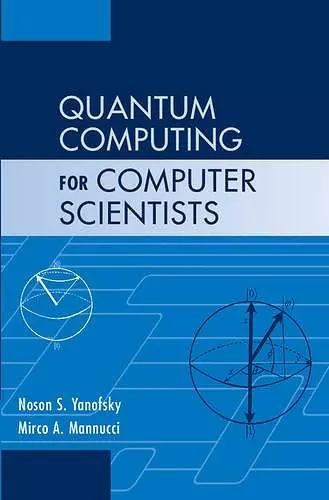Quantum Computing for Computer Scientists
Mirco A Mannucci author Noson S Yanofsky author
Format:Hardback
Publisher:Cambridge University Press
Published:11th Aug '08
Should be back in stock very soon

Finally, a textbook that explains quantum computing using techniques and concepts familiar to computer scientists.
If you want to understand (or teach) quantum computing without really advanced maths, this textbook is for you. Written for computer science students, it slices through the layers of mathematics that often surround the topic, and explains the quirks of quantum mechanics using step-by-step examples, exercises and heaps of illustrations.The multidisciplinary field of quantum computing strives to exploit some of the uncanny aspects of quantum mechanics to expand our computational horizons. Quantum Computing for Computer Scientists takes readers on a tour of this fascinating area of cutting-edge research. Written in an accessible yet rigorous fashion, this book employs ideas and techniques familiar to every student of computer science. The reader is not expected to have any advanced mathematics or physics background. After presenting the necessary prerequisites, the material is organized to look at different aspects of quantum computing from the specific standpoint of computer science. There are chapters on computer architecture, algorithms, programming languages, theoretical computer science, cryptography, information theory, and hardware. The text has step-by-step examples, more than two hundred exercises with solutions, and programming drills that bring the ideas of quantum computing alive for today's computer science students and researchers.
'The book has the potential to fill a void that needs to be filled: to bring the excitement of quantum computing to undergraduate computing majors, especially those with modest math backgrounds.' Stephen Fenner, University of South Carolina
'… makes for a truly elementary book that a computer science student, with a solid knowledge of vector spaces and linear transformations, should have no difficulty [reading]. Indeed, the authors are so careful in providing the right amount of detail that, to the more experienced student, this book will read almost like a novel. This will also make it a very good textbook for an elementary course on quantum computing … this is a book that I can recommend to anyone with a basic knowledge of linear algebra. … it [will] make a very nice textbook for undergraduate computer scientists and mathematicians …' S. C. Coutinho, SIGACT News
'… I found that I could fight my way through much more of the maths than I'd expected, largely because of the clarity of the style and the exemplary use of language. The field of quantum computing is rapidly becoming practical and potentially mainstream - think about the next generation of cryptography, for example. Now is the time to start working on your understanding of the core issues, so that you can teach the next generation of software engineers. Not an easy read, but definitely rewarding … If you aren't scared off by pages with more matrices than words, and you want to be ahead of the game when quantum computing really takes off, this book is for you.' The Times Higher Education Supplement
'… explicitly designed to be accessible to students with [a] limited mathematical background and [an] essentially zero quantum physics background. The use of many solved problems ensures that the reader grasps the mathematical essentials needed to grasp the deep concepts explained in the book. … this is a well-structured text which deserves careful consideration from instructors not only engaged with computer science teaching but also those in physics and electronic engineering. … This book will go a long way to helping develop future generations of quantum programmers.' Contemporary Physics
'This book presents some of the most exciting and interesting topics in quantum computing. … useful to mathematicians who want to understand the basic concepts and theories of quantum computations.' Mathematical Reviews
ISBN: 9780521879965
Dimensions: 260mm x 184mm x 26mm
Weight: 850g
402 pages